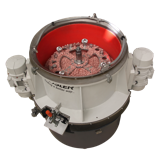
Joint Reconstruction, Part 5 - Mass Finishing for Smooth, polished surfaces
, roslerusa - Назад к обзору
Mass finishing is a highly versatile finishing technology that can be used for a wide variety of different surface treatment operations including those in the medical industry. Therefore, it is no surprise that mass finishing processes are utilized at practically every manufacturing stage for all kinds of orthopedic implants.
Rosler Metal Finishing has decades of experience in mass finishing. In this installment of the Joint Reconstruction Series, we will compare the various machines used to provide precise finishing for endoprosthetic manufacturers.
Examples of Mass Finishing
Mass finishing is used for a variety of joint
replacement work pieces including:
- Descaling and edge radiusing of hip stems, knee femorals, and other implants after forging or casting, e.g. lost wax or investment casting.
- Deburring and surface smoothing of various implants after belt or CNC grinding.
- Final polishing of knee femorals, femoral heads, and the inside of acetabular cups to Ra = 0.8 micro inches as the last finishing stage before implantation.
Commonly Used Machines
Considering their critical function in the body,
joint reconstruction implants must have a perfect surface finish without any
blemishes. Even the smallest nick or dent on a component will render them
unsuitable for implantation.
That is why during the various finishing
operations the implants must not tumble over each other. Instead,
they must be firmly attached to work piece holders so that they can never touch
each other during the entire finishing process.
Compact Drag Finishers
Rosler Compact Drag
When it comes to placing the finishing touch on knee, hip, and other joint reconstruction implants, compact drag finishers are one of the most popular finishing machines in the orthopedic implant industry. They produce excellent, extremely smooth and polished surface finishes on a wide array of implants, not only with absolutely repeatable results at zero defects, but also at surprisingly low costs.
The work pieces are individually attached to
workstations on a rotating carousel and are dragged through a stationary work
bowl filled with media.
Features of drag finishers include:
- Very high processing intensity.
- Absolutely homogeneous, all-around finishing results, batch by batch without any “dead” zones.
- Capacity for larger, highly delicate work pieces.
- Elimination of part-on-part contact and nicking of work pieces.
Automation
Drag finishers can be easily automated by
utilizing robots or specially designed material handling systems for
loading/unloading the work pieces. This allows creating autonomous, fully
automated manufacturing cells, which can be easily integrated into the overall
manufacturing process.
Special Rotary Vibrators,
Type DL
Rosler’s “DL” machines are ideal for finishing
smaller production batches. They can process larger as well as smaller
components such as ankle or shoulder implants, but also small volumes of knee
femorals and tibia plates.
R 150 DL-2 with work piece fixture
The processing bowl on DL vibrators does not have
a center dome. Instead, they are equipped with two vibratory motors mounted on
the outside of the processing bowl providing the required vibratory energy. The
work pieces are mounted to work piece fixtures located in the bottom of the
processing bowl.
Features of the DL series include:
- Much higher processing intensity than standard rotary vibrators.
- Reduced media lodging in work pieces thanks to mounting the work pieces to special fixtures.
- No risk of nicking as the work pieces do not touch each other during the process.
- Ideal operation for low production volumes and concave shapes.
Other Mass Finishing Machines
For less delicate work pieces such as screws,
trauma, spinal implants, and certain medical instruments, other mass finishing
machines including standard rotary or tub vibrators or high-energy centrifugal
disk finishing machines can be utilized.
Rosler Rotary Vibrator
- Standard Rotary Vibrators – Ideal for non-delicate work pieces, these machines differ from the DL series largely because of their center dome and lack of work piece fixtures. Rosler rotary vibrators can be adapted to automated processing at any time with modular auxiliary systems for loading, unloading, rinsing, drying, and other pre- and post-finish operations.
Rosler Tub Vibrator
- Tub Vibrators – These machines are used in applications where the biggest rotary vibrator, because of the size of the parts, might still be too small. Also known as straight tubs, these machines can accommodate large and sensitive parts. If necessary, parts can be treated in separate compartments without the risk of part on part impingement.
Rosler Centrifugal Disk
- High-Energy Centrifugal Disk Machines – Often used for bone screws, bone nails, and spinal hooks, high-energy disc machines offer an efficient alternative to conventional vibratory machines. They provide performance levels of up to 10 times higher than conventional vibratory equipment. Rosler has revolutionized the industry with our highly productive "Double Batch" system. Our reliable precision gap control features can be automatically or manually operated. This ensures process stability.
The Rosler Way
A manufacturing cell with two drag finishers and one robot for automatically loading and unloading.
If you need mass finishing expertise to finish your joint replacement implants, look no further than Rosler Metal Finishing. We can help you find a better way and achieve the exact finish needed every time. Contact us today to discuss your unique challenges.
The complete Joint Reconstruction Series includes:
- Part 1 – Expertise for Endoprosthetics.
- Part 2 – Material Standards.
- Part 3 – Finishing Standards.
- Part 4 – Comparing Surface Finishing Methods.
- Part 5 – Mass Finishing for Smooth, Polished Surfaces.
- Part 6 – Shot Blasting for Surface Finishing, Coating Preparation, and Increased Component Life Span.
Sign up for enews alerts to be notified of all Rosler blog posts!






